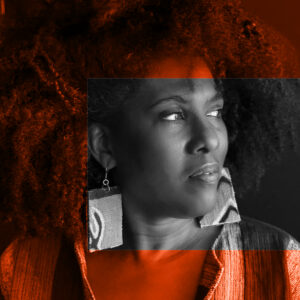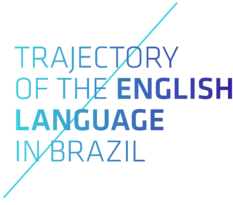Marieli Pereira

Professor Marieli is a black, hardworking woman, passionate about teaching. Born in São Paulo, she moved to a poor neighbourhood in Salvador, Bahia, as a child. Currently a doctor at the Federal University of Bahia, she works as an English language thinker and educator from a decolonial approach.
“I came to Salvador when I was six or seven years old, so I consider myself Bahian! Fate must have erred as I was born in São Paulo, but the mistake was soon corrected”, she laughs. She grew up in a poor community in the city and found a way to improve her life by becoming an English language teacher. “It’s very difficult and challenging, but at the same time I came into this world to do this. To contribute to humanity through education”, she adds.
Marieli understands very well how learning English can change trajectories. “A teacher of mine got a scholarship for a course in English. This teacher changed not only my life, but my family’s. Then I started university, my sister was also inspired and went,” she recalls.
After graduating, she returned to her community to, like her teacher, help other students achieve their dreams. Much of her childhood took place in the neighbourhood where she teaches today. She uses her experiences as a teacher and academic of foreign languages to add to the horizons of her students. “I was raised in the Nordeste de Amaralina neighbourhood, and I have a lot of the local culture inside me. But I also have this perspective from other regions. I left, went to work elsewhere, travelled, and did part of my doctorate in the US. So, I can transit through several different realities. And this all affects my interaction with the region where I teach”.
Marieli believes in the English language as a tool for social and economic mobility, but she does not forget a series of problems in language teaching. “English teaching is very elitist, very white. It is a language of the colonisers. So, I’m teaching English, but I’m not prioritising American or British culture, because if that’s the case, students don’t see themselves. And if they don’t see themselves, they won’t want to study”. This problem led to her decolonial pedagogical approach as the path of her classes in her teaching. “When the school has a textbook, I draw students’ attention to colonial narratives. For example, one text talked about how the Persians had ‘invaded’ a country, but when referring to the British, they were treated as having ‘discovered’ another location. Why does one people ‘invade’, and another ‘discover’? And from there we get into other questions. Who wrote the books, what is the interest in continuing with these narratives? And the students understand!” says Marieli.
Another form of struggle is the appreciation and memory of traditions different from those of the colonisers. “I give them stories of black people from African countries. There are more than 20 countries in Africa that have English as an official language. I also bring in Jamaica, talk about the variants there and address the movements against colonial oppression. I bring music and singers. And so, we speak English, we study grammar, analyse history and culture, but from a different perspective, not that of the coloniser, one which is not Eurocentric.”
The decolonial theme is one of Marieli’s areas of expertise. In addition to local, social and economic difficulties, the challenge of discovering English language teaching with transformative potential includes recovering facts forgotten by official history. “It is a job that requires a lot of research, because there is no ready-made product,” she explains.
To help fill this gap, Marieli got together with other teachers to create didactic material capable of consolidating part of the anti-racist education experiences. “It was Professor Joelma Santos who, in her doctorate, created an English teaching course with an Afro-centred perspective. Then, together with the students of the course, we wrote a book on this theme”, she explains. For Marieli, it is from this approach that English can become a transformation tool to contribute to Brazilian socioeconomic reality. Not as foreign knowledge, but as an instrument to be appropriated for emancipation. “bell hooks comments that English was the language of the colonisers, that we were forced to learn, but that it can be used to our advantage. For us to defend ourselves and show our worth. Sometimes a student says to me, ‘Teacher, I hardly speak Portuguese well, why do I have to learn English? There are over two thousand languages on the African continent. Yet they still speak the language of the coloniser. French, English and Portuguese. And you, descendants of these people, can’t you learn English?’ And then they think ‘if I’m a descendant of these people, I can speak any language!’
It is not, therefore, a new struggle, but a historical process of resistance against oppression. The English language, at first a tool of domination, is re-signified through memory and struggle. “These movements, whether of black or indigenous people, or those in vulnerable financial situations, have always existed. They are peoples, ethnicities and social groups that fight for some improvement. We are just continuing an old fight.”
Marieli recognises the size of the challenge in the fight against all forms of oppression such as racism and sees potential in new technologies to organise movements from the bottom up. “Before, these fights were very restricted to a certain geographically marked area. It had no possibility of being expanded. Technology, social media and the internet in general are a way for us to strengthen ourselves and reach more people.”
Marielle points out that the struggle is as constant as forgetting and that it is necessary to preserve the memory and continue. “It is important for us not to give up the fight. Angela Davis says that ‘freedom is a constant struggle’. So, there will be no truce, there will be no end. Because from one generation to another there are things that are forgotten, hidden. So, it is a job that has to be renewed, never interrupted.”
With determination, love and knowledge, Marieli teaches students to transgress an order designed for them to fail. Its practice enhances the English language as an instrument in the fight for liberation and memory. She believes in the base’s potential to turn the tide against a system based on the exploitation of black and vulnerable people. Rebel at heart, she makes English a tool against persistent coloniality.

